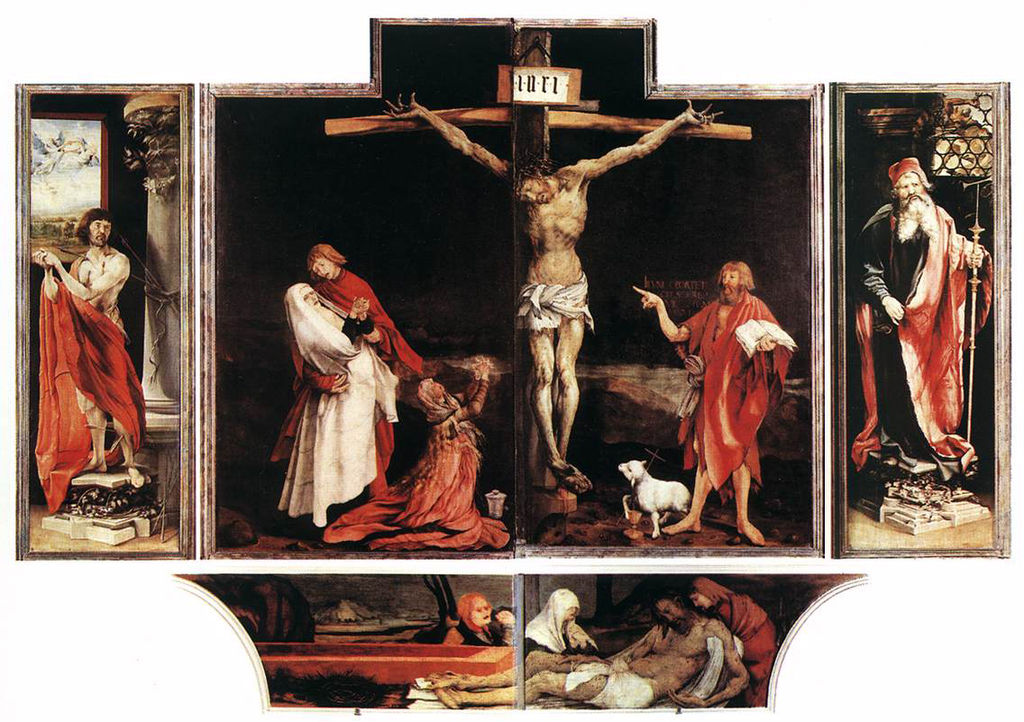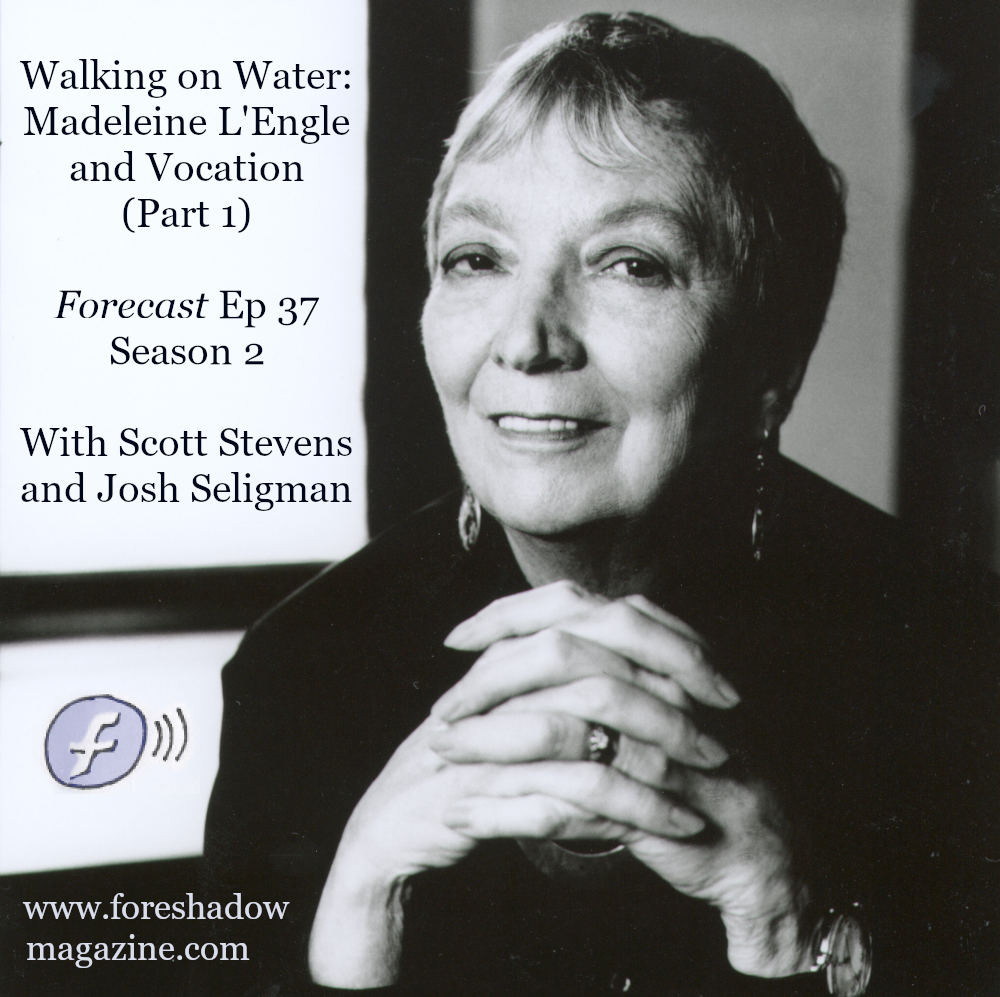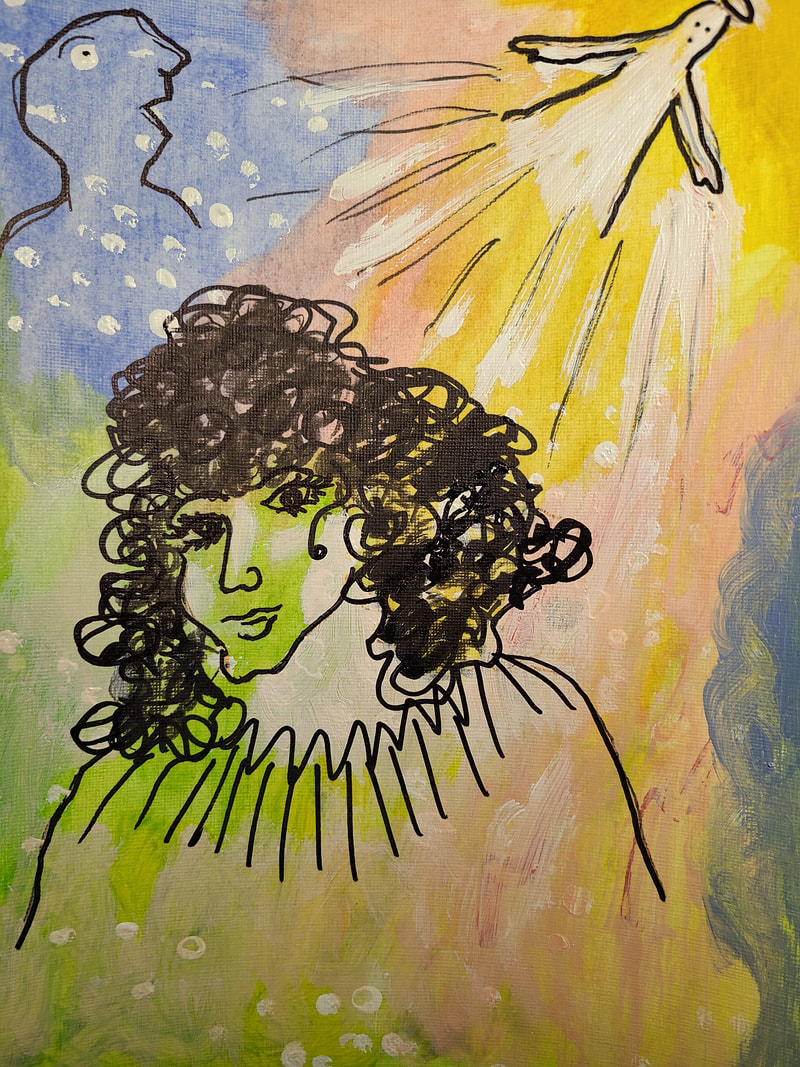|
By Alan Altany Yet it was our infirmities that he bore, our sufferings that he endured, While we thought of him as stricken, as one smitten by God and afflicted. Isaiah 53:4 In the chapel of the monastery’s hospital, the pure stench of boiling & erupting skin, going black gangrenous by the moment, rose up with a cacophony of suffered moans from the peasant patients grimly enduring St. Anthony’s fire, leprosy and plague as the monks cared for them and brought their brutally fouled bodies and afflicted souls before the painted Christ altarpiece, before the magnificent ugliness of a crucified Jesus who mirrored and consumed their own wounds, compelling their death-draining eyes towards this tortured, contorted figure perfectly abandoned, perfectly and savagely killed in frozen writhing: common people with commonly searing pustules, seizures, crunching spasms and hallucinations facing this night-drenched painting, this Christ. Grunewald painted in the hospital for years, daily seeing the stricken- down in their fatally drenched beds, stretching faith beyond breaking. His Christ: greyish–green flesh, gaping mouth, grave-blue lips, screaming hands, legions of sores heavy with death, a dead Jesus. This God of excess died like no other in dreadful beauty & unrestrained love, unrestricted, eternal empathy for His sin-corpsed, absurd humans, God now knowing their desolation and the terminal loneliness of their pain. Mother Mary, right of Jesus on the panel, collapses in John’s arms next to Mary Magdalene praying, begging; a decreasing John the Baptist to the left points fiercely to Jesus to increase. The whole chapel is a visceral scene gravitating everyone towards a gruesome, hideous Christ: eyes shut, head awfully dropped; a 16th-century painting intending miracles of body and faith by the execution of infinite compassion. Patients sense a mystical transfiguration of their poor dyings into acts of worship to the God who knew them with a mothering intimacy, seeing He sought them more deeply than their abysses, so deeply that hope found a way out of hell into hearts bowing before the infinite sacrifice of God, where He agonized in love for them and died so that they could finally become soulful fire ascending to be with the risen Christ in their new spirited-skin bodies. Jesus’s darkest night ever of any soul: a high point of art marked by the healing of tormented hearts of pushed down-and-out believers through a polyptych painting by a man whose name was not even Grunewald, but who had been touched by the reflected heat of St. Anthony’s fire and by the God of miracle-making who envisioned the painted panel itself into a miracle of a dramatically hidden resurrection, healing through immersion in death. Alan Altany, Ph.D., is a septuagenarian college professor of religious studies. He’s been a factory worker, swineherd on a farm, hotel clerk, lawn maintenance worker, small magazine of poetry editor, director of religious education for churches, truck driver, novelist, etc. He published a book of poetry in 2022 entitled A Beautiful Absurdity: Christian Poetry of the Sacred. His website is at https://www.alanaltany.com/.
'Grunewald's Crucifixion' first appeared in A Beautiful Absurdity: Christian Poetry of the Sacred. It has been republished here with the author's permission. Related work on Foreshadow: The Crucifixion of St Peter (Fiction, August 2022) Please support us by sharing this post and buying us a book.
0 Comments
After clicking 'Play', please wait a few moments for the podcast to load. You can also listen on Spotify, Apple, Google and other platforms. Listen to other Forecasts here. This episode begins a new series of Forecasts exploring the book Walking on Water: Reflections on Faith and Art by Madeleine L'Engle. Josh speaks with composer Scott Stevens about 'Chapter 1: Cosmos from Chaos', which asks 'What is Christian art?' Among other things, they discuss how true art grapples with mystery and questions of life and death, the importance of making space to listen, the artist as the servant of the work, art as an incarnational activity, how art helps us remember our true glorious identity and the terrible things we will be asked to endure and where modern art fits in with all this. Memorable passages from Chapter 1:
Scott Stevens is a composer whose versatility stems from eclectic influences. His music (listen on Spotify) is featured in multiple independent film scores as well as ads for Toyota, Saatchi & Saatchi and Red Bull, among others. Scott holds a Bachelor’s degree in Music Composition from Point Loma Nazarene University and a Master’s degree in Global Music Composition from San Diego State University.
Learn more about Scott's recent projects Sometimes I Shake here and Lines of Control here. Scott's other work on Foreshadow: Dawn Will Prevail (Music, December 2020) Perspective (Music, January 2021) Forecast (Ep 4): Listening Inwardly (Interview, April 2021) Forecast (Ep 10): The Strength of Gentleness (Compilation, July 2021) Depths (Music, August 2022) Josh is the founding editor of Foreshadow and a co-host of its podcast, Forecast. Please support us by sharing this post or buying us a book. By Michael Stalcup after Chris Rice It was the very last lines of “Our Best Minds” that compelled me to risk: return prodigal pen to poetry. “Where are you now?” he wrote. You with the great art in you, where are you? “Withering unknown on your dying bed because you were afraid to risk?” Well, that great person is not me, but I wondered what could be if I spilled a little more ink and learned to live with the mess. Who knows? My pen could free a line to liberate another soul as shy, but great. I need never know. I need only create. Michael Stalcup is a Thai American missionary living in Bangkok, Thailand. His poems have been published in Commonweal Magazine, Ekstasis Magazine, First Things, Presence, Sojourners Magazine, and elsewhere. He co-teaches Spirit & Scribe, a workshop helping writers to integrate spiritual formation and writing craft. You can find more of his work at michaelstalcup.com.
'Lines Last' first appeared in Cultivating. It has been republished here with the author's permission. Michael's other work on Foreshadow: Covenant Prayer (Poetry, September 2022) Sometimes Mercy (Poetry, September 2022) Support us by sharing this post or buying us a book. By Phil Flott but I preferred not to give them my time. I disregarded them from my sight, even while catching glimpses of them floating out the corners of my eyes, not in colors, kind of shady. I did not heed their admonitions and warnings, though my inside surely heard. I could definitely spot them appearing, oh so briefly. But when I quickly turned my head—poof, they were gone. They tried and tried to get my attention, But I rarely listened--or apologized. Phil Flott's poetry has recently appeared in Poetic Sun, Vita Poetica, Raven's Perch and other publications.
Support us by sharing this post or buying us a book. By Phyllis Green From the artist: You can turn away from God, but if you just slightly turn his way, he is there smiling down at you because his love and care are permanent. Phyllis Green is an author, playwright and artist. Her paintings can be found at ArLiJo 123, Earth and Altar, Gulf Stream Magazine, Novus, New Plains Review, CERASUS and other publications.
Phyllis' other work on Foreshadow: Jesus on the Cross (Art, April 2022) Support us by sharing this post or buying us a book. By Michael Stalcup after John Wesley I am no longer mine but wholly yours, so wield me as you will: assign my rank among the great or small; fling wide the doors to honor or humiliation, thanks or accusation—take my hand and lead me through; permit me influence and fame or have me follow you unseen and freed from weights I cannot bear—but let your name be glorified; spare me from suffering or let it shape me; bless or break my plans; extend my days or martyr me; I bring my life into your scarred and sovereign hands. Whatever comes, my heart will rest content for you are mine—your blood my covenant. Michael Stalcup is a Thai American missionary living in Bangkok, Thailand. His poems have been published in Commonweal Magazine, Ekstasis Magazine, First Things, Presence, Sojourners Magazine, and elsewhere. He co-teaches Spirit & Scribe, a workshop helping writers to integrate spiritual formation and writing craft. You can find more of his work at michaelstalcup.com.
'Covenant Prayer' first appeared in First Things. It has been republished here with the author's permission. Michael's other work on Foreshadow: Sometimes Mercy (Poetry, September 2022) Support us by sharing this post or buying us a book. Katie Sampias tells a short story of a woman deciding over an arranged marriage, a practice common in the time of Jesus Sepphora was stunned when her father first mentioned that he had received a proposal for her hand in marriage. Although 16 years old, she had not thought the time for marriage would come so soon. Sepphora had been around men all her life -- her father and brothers -- but the intricacies of marriage remained a mystery. Sometimes she imagined herself as the heroine in an ancient land, called upon to marry a mysterious man who was dark and attractive but needed to be tamed. She had been intrigued by the story of Esther living in the palace of King Ahasuerus, who used her feminine charms and intelligence to save her Jewish people. It must have been on one of her outings to the centre of town that the man from whom her father had received a proposal had seen her. Her father had returned from buying some timber for building and repairing the fishing boats. He said it would seem only practical to consider this. The man was the second eldest son of the house where he had purchased his wood, and his name was Alexander. ‘Alexander has not yet received the blessing of his family’, her father admitted. ‘They are of greater means than us, and it is possible there may be some objection. I have every reason to believe he is a man of honour, but I will make some further enquiries about this’. Sepphora shuddered a little at this last statement. How would her father be able to find out for sure that this man would treat her fairly and kindly? What if this man turned out to be like the ones she had heard horror stories about at the temple -- men who could become violent and cause pain, physically, verbally or emotionally? Her mind quickly ventured to a scary place, where her options were to leave a traumatizing situation without any security and risk being shamed by her community or remain trapped in a dangerous domestic situation. ‘What do you have to say, Sepphora?’ her father asked. ‘What are your thoughts?’ Her father’s questions broke her dark reverie. She felt a sudden urge to get away so she could process the massive life change that may be about to take place. ‘Sorry, father, this has taken me a little by surprise’, said Sepphora. 'Are you all right?' her mother asked. ‘I think I need to get away for a little while’, Sepphora told them. 'I need some time to think about this. Maybe I could visit Aunt Mary? I know she has been feeling lonely after Joseph has passed away. And I know Jesus is there for her, but maybe she would be glad of my company too.' 'I think that's a wonderful idea,' her mother said. 'Give it some time to think over your father's proposal.’ *** Mary welcomed Sepphora with loving hospitality. Mary was extremely grateful to have someone to chat with and take her mind off her own troubles. Sepphora easily fit into Mary's daily routine, helping her as she went about her chores. Conversation was easy, and Sepphora found relief in telling Mary her anxieties about marriage. Mary listened intently and did not dismiss her concerns. ‘Spend time in prayer and tell God how you feel about this prospect of marriage with Alexander’, Mary advised. ‘Marriage is a way of life in which a couple seeks to love one another and any children that might be born as a physical manifestation of God's love for us. You will never find a perfect person. Any marriage you enter into will have ups and downs, good days and bad days. Joseph and I certainly had our share of difficulties to navigate together. But what made our marriage work through it all was that we both were committed to helping each other be the best versions of ourselves for God, for each other and for other people. We put God at the centre of our marriage and prayed for our needs, relying upon God to find a way for them to be met. Ask God for his wisdom over your life and if Alexander is the best person for you. Try to learn what you can about him. Your parents are quite reasonable and will respect your wishes if you do not feel this is right for you.’ Just as Sepphora and Mary were talking over these things, a door opened, and in walked Jesus. He was carrying a hammer in one hand, and at first, he seemed deep in thought about something he had just been working on. But once he looked at Sepphora and Mary’s faces, these thoughts appeared to dissolve. He must have been able to intuit the conversation that had just passed between the two women. He smiled and let out a laugh. ‘Oh, so quiet as soon as I enter! Sorry to interrupt. I'm just here to get a bite to eat’, he said, as he casually reached for a bunch of grapes sitting on the table behind Mary and some flatbread left over from breakfast. He raised an eyebrow and looked earnestly at his cousin. ‘He's a great fellow, Sepphora. You have nothing to fear. I see him fairly regularly with my work. His family is one of my suppliers, and I actually need to go today to get some more supplies. Would you like to come with me? I know you may not want to meet Alexander in person, but you can wait for me while I go about my business. You can keep me company and get an idea about where he comes from.’ Sepphora felt both excited and nervous, but she could not refuse this offer of perhaps finding out a little more about her potential husband. When they arrived, a few people were tending to some crops and cattle. One end of the estate was filled with the largest pistachio trees Sepphora had ever seen, and alongside the large ones were others in various stages of growth. ‘Wait here,’ Jesus said, gesturing to the entrance of the main residential building. Sepphora stayed with the wagon and watched from a distance as a man came out to greet Jesus. Jesus gestured toward the pistachio trees, and the two men began walking towards the trees purposefully. Once they reached their destination, the second man seemed to be advising Jesus on which one to cut. Sepphora realised he must be Alexander. Alexander seemed quite serious and officious at first, but then Sepphora noticed Jesus was working to soften him, and before long, the two men were laughing and sharing a joke. Sepphora saw Alexander’s smile, and she could just make out small crinkles around his eyes. When he laughed, he threw his head back and softened his shoulders. Sepphora's heart warmed. If this man could share a joke with Jesus, at least she knew they could find a sense of humour in common. Sepphora then found a seat on the wagon and lay back. It would be a little while before the wood would be cut and ready to take back to Nazareth. Sepphora returned to Bethsaida a few days later. Her father told her that the marriage had indeed been approved by Alexander's family, and the couple would soon meet in person. *** When Sepphora met Alexander in person, she felt calm and peaceful. She found that he was easy to talk to, polite and considerate of her needs. He showed a genuine interest in her as a person, asked her about her hobbies and interests and listened intently. Over the next few weeks, Sepphora met with Alexander along with various members of her own and his family to discern if she wanted to accept his proposal. A new excitement about future possibilities started to enter her mind. She started to imagine the love that would be created in her new family and the new relationships that her marriage would create. She imagined holding her own children, sharing their joy and supporting them and her husband in more difficult times. She experienced deep satisfaction when imagining these scenarios, but she also started to feel some sadness. She realised she was grieving for her childhood and the life she would be leaving behind. Her days would be different, and the routines and rhythms she had known before would be gone. Her simple days of helping her mother with running the household, balancing the books and administering their family's fishing business would end. She had had a busy life as a single young woman, but not so busy that she didn’t have time to wander up and down the seashore. She would meditate on the different shapes and colours of the rocks and sand or lie on the shore and watch the clouds roll above her as her brothers, father and their men toiled on the water. Sepphora pondered how blessed she had been in her childhood. Her parents had nurtured her and provided such that she had never wanted anything. In addition to this sadness, Sepphora also experienced doubt. She began to wonder if Alexander was the best possible suitor for her. She had not met any other potential husbands. She started to worry that she would marry him, only to find out later that in fact there was a better match for her. Sepphora struggled to reconcile these different thoughts and feelings within her so that she could make a clear decision. She did as Mary suggested and asked God to reveal to her whether the marriage with Alexander was right for her. She listened and felt that when making any big decision, there was always bound to be some uncertainty and even grief in leaving things behind. Sepphora felt she should decide based on whether she believed this path of marriage with Alexander would best help her serve and love God and others, including herself. Sepphora’s family members who had met with him had only made positive comments about the prospective match, like her mother, who had noted that Alexander’s practical bent would complement Sepphora’s creative and imaginative tendencies. Her father had noted that Sepphora and Alexander shared a similar sense of humour, and when they were both laughing together, their joy was contagious and felt by all those around them. And Alexander's own family had a good name, a reputation Alexander had lived up to in his dealings with other people through his business and personal relationships. He seemed to love and serve God to the best of his ability, which included loving and serving the people in his life. Despite the doubts and sadness, Sepphora felt an overriding peace. She decided to act on that and told Alexander she wished to accept his proposal. *** Sepphora’s attendants made the final adjustments to her finery. Once they were satisfied with their work, one lit a torch, and then the others followed, one by one, carefully and silently. The occasion was joyous, but at this moment, the quiet also marked its solemnity. All the anxiety from uncertainty and sadness for what she was leaving behind left her. She felt her soul lifted up by what almost felt like winds of joy and peace. Now it was time. She and her attendants began to walk slowly towards Alexander's home -- the home that, after this evening, would also be her own. The air was warm but dry and crisp, and some amber light left over from the sunset glowed above the mountains on the horizon. Several men were carrying large stone containers for storing water into the house. The pebbles on the path crunched beneath her sandals, and her attendants began to sing. Sepphora too joined in their trills, letting the newfound peace swell within her. A smile glowed from within and filled her face as the group continued on their journey to where Sepphora's new life would begin in the town of Cana. Katie Sampias writes fiction based on the Gospels and is a wife and mother of three children. She is based in Australia. You can find out more about her work here.
Support us by sharing this post or buying us a book. By Michael Stalcup Sometimes mercy is a shipwreck, dreams dashed on undesired shores, stores swallowed up by the raging sea as you scramble ashore with your very life, unsure what, if anything, remains, where, if anywhere, you stand, how, if possible, to go on, only to find, in time, hidden treasure on an island with no gold. Michael Stalcup is a Thai American missionary living in Bangkok, Thailand. His poems have been published in Commonweal Magazine, Ekstasis Magazine, First Things, Presence, Sojourners Magazine, and elsewhere. He co-teaches Spirit & Scribe, a workshop helping writers to integrate spiritual formation and writing craft. You can find more of his work at michaelstalcup.com.
'Sometimes Mercy' first appeared in Firewords Magazine. It has been republished here with the author's permission. Support us by sharing this post or buying us a book. By Steven Searcy Do what cannot be left undone-- before the chiming clock, before the rising sun, before the sky turns black, before the war is won, do what cannot be left undone. Say what cannot be left unsaid-- before the doorbell rings, before the daily bread, before the sparrow sings, before the sun turns red, say what cannot be left unsaid. Do what cannot be left undone-- before the mountains fall, before the rivers run, before the crickets call, before the yarn is spun, do what cannot be left undone. Say what cannot be left unsaid-- before the frigid night, before the books are read, before the dimming light, before the empty bed, say what cannot be left unsaid. Steven Searcy lives with his wife and three sons in Atlanta, Georgia, where he earns a living working as an engineer in fibre optic telecommunications. His poetry has been published in
Ekstasis Magazine, Reformed Journal, Fathom Magazine and The Clayjar Review. Steven's other work on Foreshadow: Morning Prayer (Poetry, August 2022) Support us by sharing this post or buying us a book. Caroline Liberatore Nails sinking into earth Warm soil enveloping Clasp the jewel, resurfacing With heliotropic mirth These stones, these words Burrowed since before time Stumbled upon, predestined rhyme And me, only happening to have heard Caroline Liberatore is a poet and library worker from Cleveland, Ohio. She has also been published in Ekstasis Magazine, Amethyst Review and Agape Review, among others. You can read more of her work at carolinelib.wordpress.com.
Caroline's other work on Foreshadow: Library Liturgy (Poetry, February 2022) Ecology (Psalm 84) (Poetry, August 2022) Support us by sharing this post or buying us a book. |
Categories
All
ForecastSupport UsArchives
July 2024
|




 RSS Feed
RSS Feed
